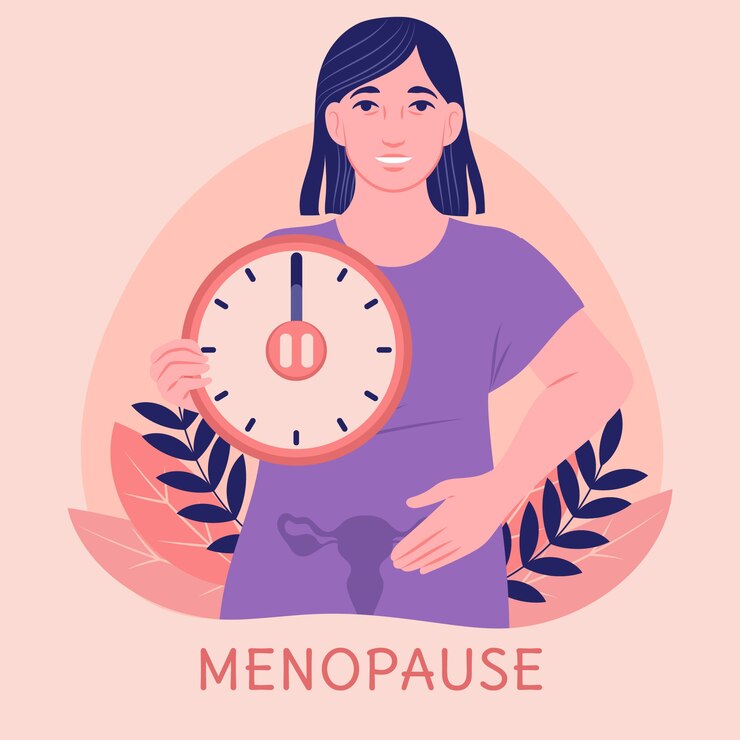
It’s becoming more common for women to wonder whether what they’re experiencing is related to menopause or pregnancy. Some women go through early menopause, while others may conceive later in life. There are even stories of women believing they were in menopause only to find out they were pregnant instead—an unexpected twist that can be quite shocking. That’s why it’s important to understand how these two conditions overlap and differ.
This article covers the symptoms of menopause and pregnancy and how to tell them apart, while also exploring how these conditions are diagnosed and managed.
How to Recognize Menopause
Menopause marks the stage in a woman’s life when her menstrual periods stop entirely. This happens as the body produces less of the hormones estrogen and progesterone. A woman is considered to be in menopause if she hasn’t had any menstrual bleeding (even spotting) for 12 consecutive months.
Before menopause begins, there’s a transition period called perimenopause. During this phase, a woman may notice changes in the regularity, duration, or amount of bleeding during her periods. According to the U.S. Office on Women’s Health, most women enter perimenopause in their mid-to-late 40s, and this stage can last anywhere from 2 to 8 years.
# Symptoms of Menopause
In addition to irregular periods, other common symptoms of menopause may include:
– Night sweats
– Hot flashes
– Vaginal dryness
– Sleep disturbances
– Changes in mood
Recognizing Pregnancy
Many symptoms of pregnancy can resemble those of menopause, which can make it confusing for some women. For instance, a pregnant woman won’t have a menstrual period, but light spotting can occur early on and might be mistaken for a period. Pregnant women may also experience mood swings and difficulty sleeping, much like those going through menopause.
# Common Pregnancy Symptoms
In addition to the above, symptoms of pregnancy may include:
– Nausea or vomiting (commonly called morning sickness)
– Frequent urination
– Breast tenderness
– Fatigue
– Food cravings or aversions
Because many of these overlap with menopause symptoms, it’s easy for someone to misinterpret whether she’s pregnant or approaching menopause.
Diagnosing Pregnancy and Menopause
# Diagnosing Pregnancy
If a woman thinks she might be pregnant, the first step is to take a home pregnancy test, which measures the level of the pregnancy hormone, human chorionic gonadotropin (hCG), in her urine. However, it’s worth noting that these tests aren’t always completely accurate.
For more precise results, a doctor can perform blood tests to check for hCG and progesterone levels, which are typically elevated during pregnancy. An ultrasound, which detects a fetal heartbeat using sound waves, is considered the most conclusive way to confirm pregnancy.
# Diagnosing Menopause
Determining whether a woman is in menopause or perimenopause can be trickier. While hormone tests can help detect reduced levels of estrogen and progesterone, these hormone levels naturally fluctuate throughout the month. As a result, a single test result isn’t always definitive.
Doctors typically rely on a detailed account of symptoms, especially changes in menstrual patterns, to help diagnose menopause. In some cases, a doctor may also use blood tests to assess hormone levels, but it can be difficult to predict when a woman’s periods will stop completely.
Steps to Stay Healthy During Menopause
If a woman has entered menopause, there are several steps she can take to maintain her health:
1. Eat a Nutritious Diet
A diet rich in fruits, vegetables, lean proteins, and low-fat dairy is essential. Since menopause can lead to decreased bone density due to lower estrogen levels, it’s also important to consume adequate calcium and vitamin D to support bone health.
2. Exercise Regularly
Physical activity helps reduce stress, maintain muscle strength, and promote heart health. Even moderate activities like walking, cycling, or attending fitness classes like aerobics for 30 minutes a day can make a big difference.
3. See a Doctor for Routine Check-ups
Regular medical exams can help detect health issues early, improving the effectiveness of any necessary treatments. These visits are especially important during menopause, a time when certain health risks may increase.
4. Consider Hormone Replacement Therapy (HRT)
Some women choose HRT to manage menopause symptoms like hot flashes and mood changes. However, it’s important to discuss the risks and benefits with a doctor, as HRT can increase the risk of conditions such as breast cancer. This decision should be made based on individual health needs and circumstances.
Final Thoughts
Whether a woman is navigating menopause or pregnancy, recognizing the symptoms and seeking medical advice can help her better understand what’s happening in her body. Both experiences are significant life stages that require care and intentional health decisions to ensure overall well-being.